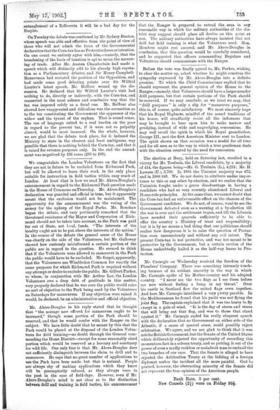On Tuesday the debate was continued by Mr. Sydney Buxton,
whose speech was able and effective from the point of view of those who will not admit the force of the Governmental declaration that the Corn-tax has no Protective force or intention. On one count we entirely agree with him,—namely, that the broadening of the basis of taxation is apt to mean the narrow- ing of trade. After Mr. Austen Chamberlain had made a speech which will distinctly add to his already high reputa- tion as a Parliamentary debater, and Sir Henry Campbell- Bannerman had restated the position of the Opposition, and had made some good debating points over Sir Wilfrid Laurier's latest speech, Mr. Balfour wound up the dis- cussion. He declared that Sir Wilfrid Laurier's visit had nothing to do, directly or indirectly, with the Corn-tax, and reasserted in the most solemn and conclusive way that the tax was imposed solely as a fiscal one. Mr. Balfour also showed how exaggerated and ridiculous was the accusation as to the tax constituting the Government the oppressor of the widow and the tyrant of the orphan. That is sound sense. The use of language suited to a real burden on the poor in regard to the present tax, if it were not so palpably absurd, would be most immoral. On the whole, however, we are glad that the debate took place, for it induced the Ministry to state in the clearest and least ambiguous way possible that there is nothing behind the Corn-tax, and that it is raised for revenue purposes only. In the end the amend- ment was negatived by 108 votes (296 to 188).






































 Previous page
Previous page